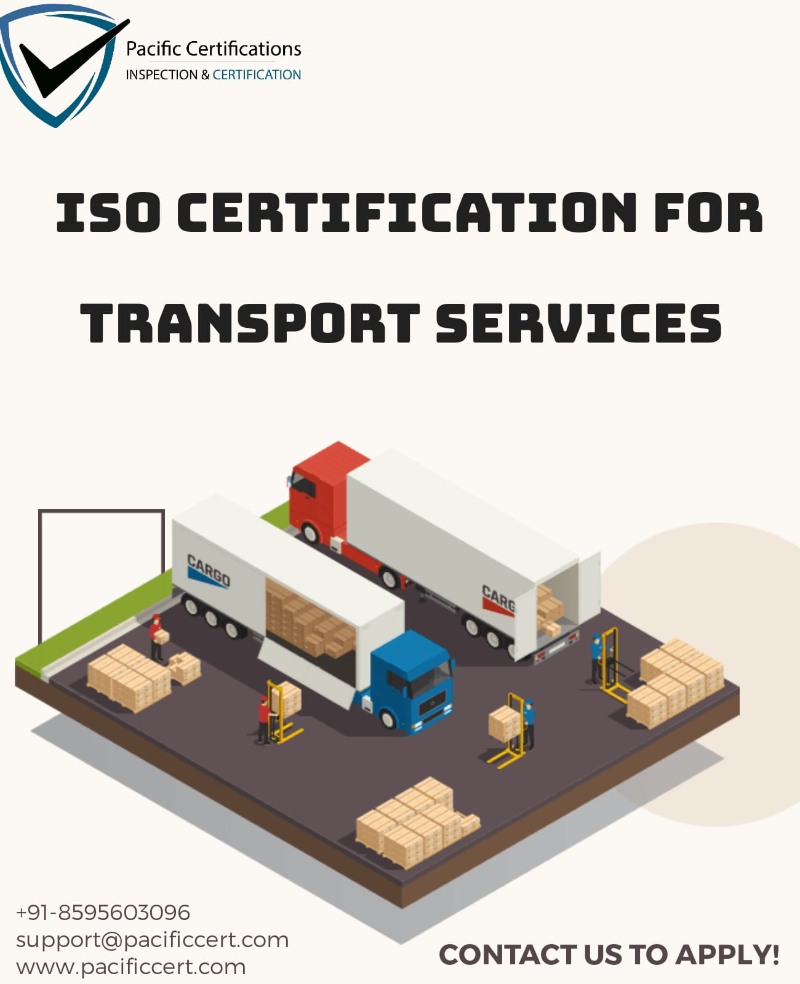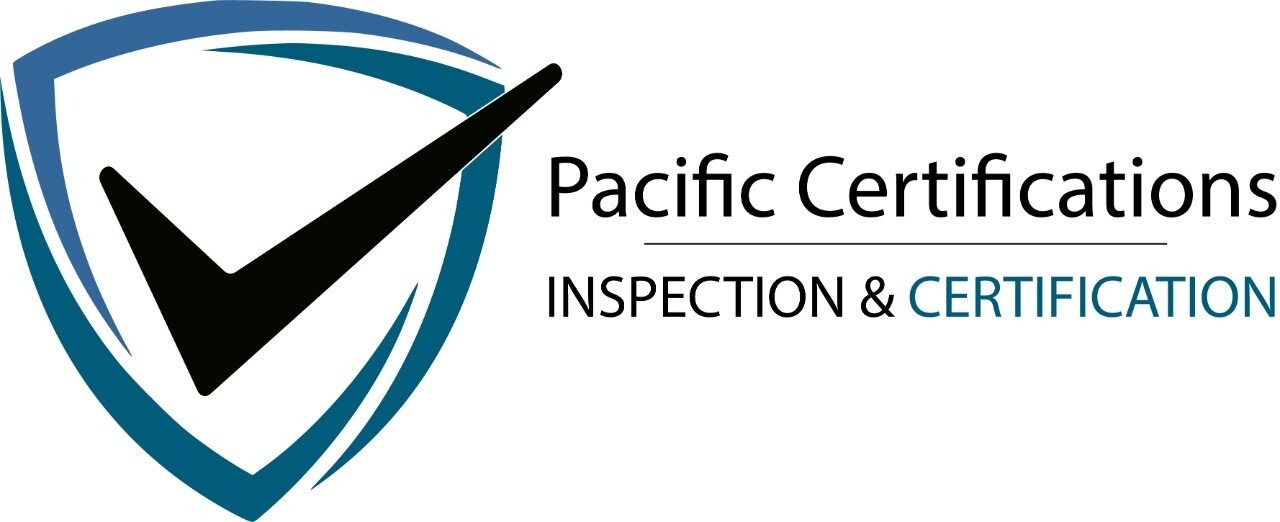ISO Certifications for Transport Industry, Requirements and Benefits

Introduction
The transport industry forms the backbone of global trade and logistics, connecting suppliers, manufacturers, and consumers across regions. Whether by road, rail, air, or sea, transportation companies face increasing challenges such as safety, compliance, and customer satisfaction etc.
ISO certifications compliance provides a structured framework to manage these challenges. These standards help transport operators improve efficiency, reliability, safety, and sustainability.
Safe and sustainable transport isn’t achieved by chance — it’s built through structured systems, disciplined safety, and certified performance — Pacific Certifications
Applicable ISO Standards for the Transport Industry
Below are some common ISO standards that apply to transport industry:
Standard | Type | Purpose / Key Relevance |
|---|---|---|
ISO 9001 – Quality Management Systems (QMS) | Certifiable | Ensures consistent service delivery, improved efficiency, and customer satisfaction across logistics and transport operations. |
ISO 14001 – Environmental Management Systems (EMS) | Certifiable | Helps reduce emissions, fuel waste, and pollution while improving sustainability. |
ISO 45001 – Occupational Health & Safety Management Systems (OHSMS) | Certifiable | Protects drivers, operators, and maintenance staff from workplace and road hazards. |
ISO 39001 – Road Traffic Safety Management Systems (RTSMS) | Certifiable | Specifically designed to reduce traffic accidents, injuries, and fatalities in road transport operations. |
ISO 27001 – Information Security Management Systems (ISMS) | Certifiable | Secures transport management systems, shipment data, and customer information from cyber risks. |
ISO 22301 – Business Continuity Management Systems (BCMS) | Certifiable | Ensures continued operations during supply chain disruptions, accidents, or natural disasters. |
ISO 50001 – Energy Management Systems (EnMS) | Certifiable | Improves fuel efficiency and reduces energy consumption across fleets and facilities. |
ISO 28000 – Supply Chain Security Management Systems | Certifiable | Manages risks in transportation and logistics supply chains, ensuring cargo integrity and security. |
ISO 31000 – Risk Management (Guidelines) | Guidance | Provides a systematic approach to identify and mitigate operational, financial, and security risks. |
ISO 9001: Quality Management System (QMS)
ISO 9001 is a widely recognized standard that outlines the requirements for a Quality Management System. Transport companies can use ISO 9001 to demonstrate their ability to meet customer needs and maintain high service standards.
ISO 14001: Environmental Management System (EMS)
ISO 14001 provides guidelines for establishing an Environmental Management System. This standard helps transport companies to minimize their environmental impact.
ISO 45001: Occupational Health and Safety Management System (OH&S MS)
ISO 45001 is focused on Occupational Health and Safety Management. It helps companies create a safe and healthy working environment, prevent accidents, and comply with relevant health and safety regulations.
ISO 27001: Information Security Management System (ISMS)
ISO 27001 addresses Information Security Management. Transport companies often handle a significant amount of data, including customer information and logistics details, making information security critical for their operations.
What are the requirements of ISO Certifications for Transport Businesses?
Specific requirements:
ISO 9001 (Quality Management)
- Focus on meeting customer expectations and regulatory requirements.
- Establish processes for continuous improvement.
- Monitor and measure performance.
- Ensure staff training and involvement in quality processes.
ISO 14001 (Environmental Management)
- Implement environmental policies to minimize waste and pollution.
- Identify and control environmental impacts.
- Monitor compliance with environmental laws.
- Continuously improve environmental performance.
ISO 45001 (Occupational Health and Safety)
- Develop a safe and healthy workplace by identifying risks.
- Implement processes to prevent workplace injuries and illnesses.
- Promote staff involvement in health and safety initiatives.
- Regularly evaluate and improve safety measures.
ISO 27001 (Information Security Management)
- Protect sensitive data through risk management.
- Implement controls to prevent security breaches.
- Ensure confidentiality, integrity, and availability of information.
- Continuously monitor and improve information security systems.
ISO 55001 (Asset Management)
- Ensure effective control and management of assets.
- Develop a structured approach to asset lifecycle management.
- Align asset management with business goals.
- Improve asset performance and reduce costs over time.
Generic Requirements (Applicable Across All Standards):
- Policy & Objectives: Define safety, quality, and sustainability goals aligned with business strategy.
- Risk Assessment: Identify risks related to accidents, route management, cargo handling, and information security.
- Process Documentation: Establish procedures for transport planning, vehicle maintenance, loading/unloading, and emergency response.
- Training & Competence: Train drivers, operators, and staff in road safety, compliance, and quality management.
- Internal Audits: Conduct audits to verify compliance with operational and regulatory requirements.
- Management Review: Evaluate performance, incidents, and customer feedback regularly.
- Corrective & Preventive Actions: Address nonconformities and apply preventive measures to avoid recurrence.
- Legal & Regulatory Compliance: Meet national and international transportation, safety, and environmental laws.
- Monitoring & Measurement: Track KPIs such as fuel use, route efficiency, accident rates, and emissions.
- Continuous Improvement: Use data-driven insights to enhance service quality and safety over time.
Tip: Integrate driver training, vehicle maintenance, and route risk assessment into one ISO-based management system — it enhances safety and reduces operational costs.
Contact us today to start your certification journey!
What are the benefits of ISO Certifications for Transport Industry?
ISO certification offers various benefits to the transport industry, helping companies improve their operations and demonstrate commitment to quality, safety, and environmental responsibility. Some of the key benefits of ISO certifications for the transport industry include:
- Efficiency – ISO 9001 helps streamline fleet management, reduce downtime, and improve service consistency.
- Safety Performance – ISO 39001 and ISO 45001 reduce accidents, injuries, and fatalities.
- Environmental Responsibility – ISO 14001 and ISO 50001 optimize energy and fuel consumption while reducing emissions.
- Supply Chain Security – ISO 28000 ensures safe cargo handling, preventing theft and tampering.
- Customer Satisfaction & Reliability – Improved processes lead to on-time deliveries and better client trust.
- Compliance – Certification demonstrates adherence to international safety and environmental standards.
- Business Continuity – ISO 22301 ensures resilience against disruptions like strikes, breakdowns, or disasters.
- Data Security – ISO 27001 safeguards tracking systems and logistics data from cyber threats.
- Certified operators are more competitive in global logistics contracts and government tenders.
- ISO certification builds credibility, transparency, and trust with clients and partners.
According to a recent Fortune Business Insights, the global transport and logistics market is expected to reach USD 14 trillion by 2030, growing at a CAGR of 6.2%. Key growth drivers include e-commerce expansion, digital fleet management, and sustainability initiatives.
Research shows that companies certified to ISO 39001 and ISO 9001 experience a 25–40% reduction in road incidents and improved driver performance. Similarly, ISO 50001 adoption in transport fleets reduces energy costs by up to 12–15% annually.
In coming years, integrated ISO systems combining quality, safety, security, and energy management will be essential for achieving carbon neutrality and global competitiveness in transport operations.
How Pacific Certifications Can Help
Pacific Certifications is accredited by ABIS, we offer independent audit and certification services for all major ISO standards relevant to transport and logistics companies. We focus on impartial, accredited certification recognized worldwide.
Pacific Certifications can help by:
Conducting audits for ISO 9001, 14001, 45001, 39001, 28000, 50001, and 27001.
Issuing globally accepted ISO certificates for single-site and multi-site transport operators.
Supporting integrated management system certification for transport fleets and logistics hubs.
If you need support with ISO certification for your Transport Business, contact us at [email protected] or +91-8595603096.
Author: Pooja

Read more: ISO Certification for Textile Industry-Related standards-Requirements-Benefits
